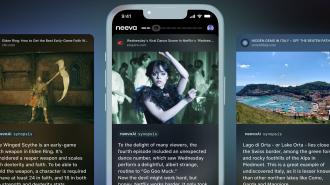This article is an installment of Future Explored, a weekly guide to world-changing technology. You can get stories like this one straight to your inbox every Thursday morning by subscribing here.
Ad-free search engine Neeva is about to release an update that lets it respond to questions with conversational text — like the hugely popular ChatGPT, but with citations and real-time data.
“This is a search engine engaging in friendly and authentic conversation about a user query backed up with primary references,” Neeva co-founder Sridhar Ramaswamy told Freethink.
The Google approach
When a user asks Google for help finding something online, it responds with a ranked list of what it believes are high-quality, relevant results — but the first few results aren’t necessarily the highest quality or most relevant options.
Often, these top spots are filled by ads linking to sites related to the query. The owners of those websites pay Google when users see or click on the ads, and that search ad money accounts for 58% of Google’s total revenue.
“I felt like a better product was possible, and that we had all given up.”
Sridhar Ramaswamy
It’s in Google’s best interest to make ads as relevant to users as possible because that increases the likelihood they’ll click the links — and, in the long-term, continue using Google. Advertisers, meanwhile, will pay more if they know their ads are being displayed to their ideal audience.
To facilitate this, Google collects data about users — such as their age, gender, location, browsing history, household income, and more — and then lets advertisers filter their target audiences based on those characteristics.
This means Google users regularly have to scroll past advertisements to get to the search results they want, and they have to accept that the company is tracking them and monetizing their personal data.
The Neeva alternative
Ramaswamy might know more about Google’s approach to advertising than anyone else in the world — prior to quitting Google in 2018, he’d spent 15 years with the company and was in charge of its advertising arm.
In June 2021, he teamed up with Vivek Raghunathan — then-VP of Monetization at YouTube, a Google subsidiary— to launch Neeva.
“I wanted to go back to basics and create a product that was about the user,” Ramaswamy told TechCrunch. “I felt like a better product was possible, and that we had all given up.”
The Neeva search engine revolves solely around the needs of searchers, not advertisers.
Unlike Google, Neeva is privacy-focused — the company doesn’t share or sell its users’ data for profit — and instead of relying on ad revenue, it sells subscriptions to customers, with plans costing about $50 annually.
The idea is to eliminate the conflict of interest between the user and the advertiser over search results by making the search engine revolve solely around the needs of searchers.
There is a free tier with limited monthly searches, but in exchange for subscribing, Neeva users get unlimited ad-free searches, as well as a VPN, a password manager, and early access to new features — such as the upcoming NeevaAI.
AI-powered search
Much has been written about the potential for OpenAI’s ChatGPT — an AI chatbot trained to generate human-like text in response to prompts — to disrupt the search engine status quo.
While Google will respond to the query “chocolate chip cookie recipe” with a list of links to recipes, ChatGPT responds with a recipe written in easy-to-understand text. Don’t like that recipe? Ask the AI for another, and it’ll deliver.
This eliminates the need to click through to another site and then sift through its content to find the answer to your query — or the need to scroll past ads (at least for now — ChatGPT is expensive to operate and OpenAI will need to monetize it at some point).

ChatGPT has a few shortcomings that make it a less-than-ideal alternative to Google, though, with a major one being that, while its answers may sound right — and often are — they can also contain basic factual errors.
The AI is also incapable of providing sources for its answers, which makes it harder to fact-check them — and because the training of ChatGPT ended in early 2022, it has no training on more recent events.
NeevaAI
Neeva is now beta testing NeevaAI, a feature that works a lot like ChatGPT — delivering conversational, text-based responses to queries — but without those shortcomings.
“NeevaAI shows a synthesized single answer summarizing the most relevant sites to a query,” Ramaswamy told Freethink. “Importantly, references and citations are directly embedded in the answer, enabling users to determine the authenticity and trustworthiness of the result.”
NeevaAI could signal a shift from “searching” the internet to simply asking it for answers.
Those references can make it easier for users to fact-check NeevaAI’s responses than ChatGPT’s, but Neeva is also leveraging its ability to gauge a website’s authority on a subject to decrease the likelihood of inaccuracies in the first place.
“As we look at a page, we understand its contents, incoming links, and other authority signals that tell us whether the page is important and useful,” explained Ramaswamy.
And because Neeva is constantly crawling the web and indexing new pages, its AI can respond to queries on current events, unlike ChatGPT.
“By combining AI with Neeva’s in-house search stack, results are lightning fast, timely, and relevant,” said Ramaswamy.
Ramaswamy recently gave his Twitter followers a sneak peek at NeevaAI, showing how a query returns a summary from top webpages, along with photos and swipeable cards highlighting relevant info about the topic.
“The cards also suggest other important follow up questions,” he told Freethink. “Users have the option to find out more on almost everything in the card.”
On December 12, he said that he expects NeevaAI to become “generally available” in the coming weeks.
If the world is still as enchanted by ChatGPT then as it is now, the buzz could help Neeva lure some people away from Google and to a conversational, ad-free search engine — potentially signaling the beginning of major shift in which we stop “searching” the internet and start simply asking it for answers.
We’d love to hear from you! If you have a comment about this article or if you have a tip for a future Freethink story, please email us at [email protected].






